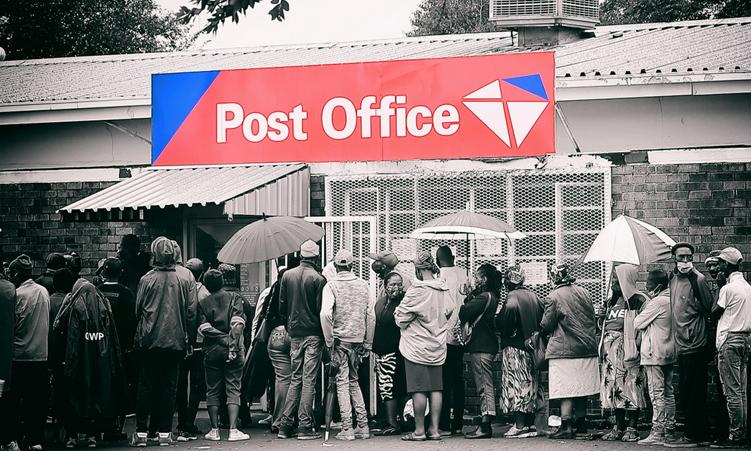The South African (SA) Post Office owes creditors at least N$4,4 billion, and one creditor has now emerged successful in its high court bid to have the state-owned entity placed under provisional liquidation.
Over the past 15 years, the SA Post Office has sailed close to the wind as the state-owned enterprise (SOE) recorded consecutive financial losses and continued to operate without paying its bills.
Being overdue on its bills has worsened in recent years, with the entity defaulting on rental payments to landlords for its nearly 1 300 branches, and owing the SA Revenue Service millions of rands in taxes relating to salary payments.
The post office could also not afford to pay statutory contributions on behalf of its more than 10 000 workers, including medical aid, pension savings and unemployment insurance fund benefits.
And now the SA Post Office’s future hangs in the balance as it has been placed under provisional liquidation – a process that may lead to its doors permanently closing after operating for more than 30 years.
A property company called Bay City Trading 457, which leases properties to the SA Post Office, grew tired of the SOE not paying rent and approached the Pretoria High Court to have it provisionally liquidated.
It is unclear how much Bay City Trading 457 is owed by the SA Post Office, but the SOE owed creditors N$4,4 billion as of 31 March 2022. Its total liabilities at group level exceeded total assets by N$4 billion, rendering it technically insolvent.
On 9 February this year, the court ruled in Bay City Trading 457’s favour and placed the SA Post Office under provisional liquidation.
BEYOND REDEMPTION
That Bay City Trading 457 chose the provisional liquidation route instead of a process to rehabilitate the SA Post Office indicates that the SOE is arguably beyond redemption.
Liquidation usually is the last resort and follows after a failed business rescue process.
A provisional liquidation portends a process of winding up the SA Post Office, which involves its assets being sold, with the proceeds of this sale being used to pay liquidation expenses and the SOE’s creditors.
It is usually hard for companies to be rehabilitated and to resume trading at this juncture.
The high court placed the SA Post Office under provisional and not final liquidation because it wants all affected parties – including the SOE’s management, workers, and creditors – to put forward their reasons why the court should not order the final liquidation of the SOE.
This process is set to play out in court on 1 June.
A final liquidation is a worst-case scenario as it would result in the SA Post Office’s operations closing permanently and workers permanently losing their jobs.
Final liquidation of the SA Post Office would also be detrimental to SA’s social grant system as the SOE distributes social grants to more than seven million beneficiaries every month.
In the interim, the Pretoria High Court has appointed Anton Shaban and Hlamalane Jerry Musi as provisional liquidators.
This was confirmed by the court on 30 March.
Their job will involve safeguarding the SA Post Office’s assets, contacting the SOE’s creditors to establish what they are owed, ranking them in terms of seniority, and trying to collect outstanding debt.
Payments to creditors have also been halted.
Shaban and Musi will be required to meet the SA Post Office’s management following the court-ordered provisional liquidation.
In a media statement released on Wednesday, Shaban said: “We erre currently in the process of engaging with the SA Post Office management and their appointed attorneys and all stakeholders.”
The SA Post Office has been mum on the provisional liquidation, saying it would issue a media statement later in the week.
The writing has been on the wall regarding the SOE’s decline, and has reported a financial loss of N$2,2 billion for the year ending in March 2022.
The company has been reporting financial losses for 15 consecutive years.
GLOBAL STRUGGLE
Postal companies globally are struggling to reinvent their operations in a world in which consumers rely far more on electronic methods of communication than they do on mail.
People are also opting for faster, more efficient parcel delivery services run by private sector companies.
The SA Post Office is painfully aware of this major shift in consumer patterns, exacerbated by the company not being able to fulfil its basic function of delivering mail on time and to the right address.
For instance, the SA Post Office’s mail delivery performance reached 75% in 2017. It fell to 68,3% in 2022.
The SA Post Office has missed its self-imposed target of an 80% mail delivery performance for many years.
Recent requests for taxpayer-funded bailouts by the SOE have failed, with the company’s numerous attempts for help recently rejected.
But finance minister Enoch Godongwana granted the SA Post Office a bailout of N$2,4 billion in South Africa’s February budget to recapitalise its balance sheet.
– Business Maverick
Stay informed with The Namibian – your source for credible journalism. Get in-depth reporting and opinions for
only N$85 a month. Invest in journalism, invest in democracy –
Subscribe Now!








